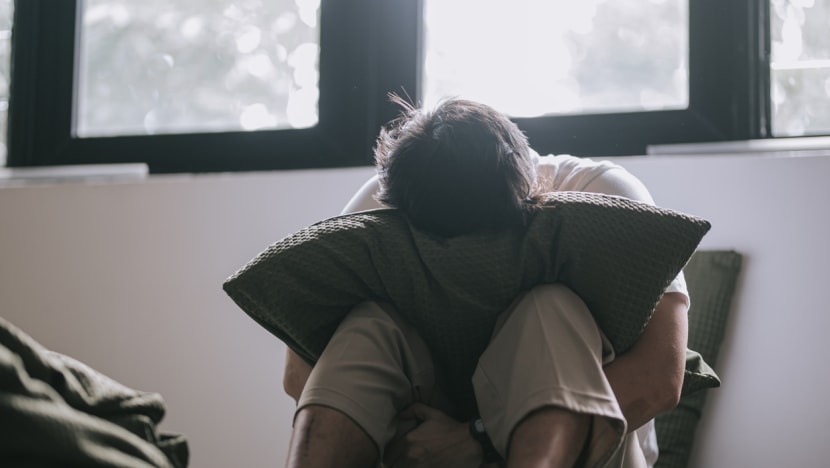Commentary: Don't make people dealing with a mental health crisis tell their story twice
When someone is suicidal, anxious or disoriented, having to recount the same painful experience to multiple strangers can feel unbearable, says psychiatrist Dr Jared Ng.

File photo. One of the most overlooked aspects in mental healthcare is how difficult it is for someone who is suicidal or in distress to pick up the phone and ask for help. (Photo: iStock/Edwin Tan)

This audio is generated by an AI tool.
SINGAPORE: One of the most overlooked aspects in mental healthcare is how difficult it is for someone who is suicidal or in distress to pick up the phone and ask for help. What makes that even harder is having to tell their story repeatedly to different professionals across different systems.
Over the past year or so, Singapore has made mental health and well-being a key priority in its national agenda, amid rising concerns over psychological stress, particularly among young people.
But until recently, those in crisis faced a patchwork of helplines. The Institute of Mental Health (IMH) operated its own helpline. The Samaritans of Singapore (SOS) ran an important suicide prevention hotline. ComCare supported those in financial crisis, while Tinkle Friend catered to children. During the COVID-19 pandemic, the National CARE Hotline received more than 76,000 calls over about two and a half years.
Alongside those, there were also helplines run by community organisations. While each serves a purpose, the number of options can undoubtedly be confusing for someone in distress.
Singapore’s new 1771 national mental health helpline, launched in June, is designed to change that. One number. 24/7 access. Call, WhatsApp, webchat.
This is the first time Singapore has brought these options together in one national helpline. It is meant to be the first stop where trained counsellors can listen, assess and help people figure out what comes next.
This is a useful idea. For people in distress, such guidance is valuable. But as someone who has worked in this field for over two decades, including having overseen the IMH mental health helpline and currently serving on the board of SOS, I also feel it is important to be clear about what this helpline can, and cannot, do.
“YOUR CALL IS IMPORTANT TO US. PLEASE HOLD”
The nature of crisis helpline work is intense. It can wear down even the most dedicated professionals. High turnover and fatigue are real risks that can erode the quality of the entire service. Empathetic, experienced leaders who understand what it feels like to take these calls can make all the difference.
From what we know so far, the counsellors are experienced and have training in mental health support. But the real test will be whether staffing levels, training standards and clinical supervision are strong enough to meet the volume and complexity of calls.
If the service is well-publicised, and it should be, it will likely see demand surge. That was the experience in the United States when they launched the 988 crisis line in 2022. In its first year, call and text volume jumped by more than 30 per cent. Even with significant funding, many centres were overwhelmed.
We need to consider: What happens when the call lines are jammed? What happens when a caller presents with complex trauma or imminent risk of suicide?
When I was overseeing the IMH helpline, we were always worried about dropped calls and unanswered messages. We wondered who we might have missed and what might have happened to them. Some of the calls that did get through were from people who were moments away from harming themselves.
“CAN YOU TELL ME WHAT HAPPENED AGAIN?”
This is why training and supervision are so important.
One of the strengths of the IMH helpline was the clear clinical oversight and protocols. Counsellors had structured supervision and access to experienced psychiatrists if they encountered high-risk situations.
The government has shared that 1771 counsellors can escalate cases to different responders. In a crisis, the call might be transferred directly to IMH or, in some cases, the police.
That is appropriate. But protocols alone are not enough. There must be assurance that every 1771 counsellor has consistent, in-depth training in suicide risk assessment, de-escalation and trauma-informed care.
In a crisis, words can save lives or endanger them. A rushed conversation or a dismissive tone can push someone away from seeking help forever.
This brings up another critical point: If a caller needs escalation, will they have to repeat their story again to each person they are handed over to?
When someone is suicidal, anxious or disoriented, having to recount the same painful experience to multiple strangers can feel unbearable.
Ideally, with the caller’s consent, the 1771 counsellor should be able to relay the critical details to the next professional, so that access to help is as simple and seamless as possible.
“I’ll PUT YOU ON THE WAITING LIST”
Another point that deserves attention is what happens after the call ends. Many people who call helplines need more than one conversation. They may need therapy, social support or medical treatment. But referrals only work if the services they’re sent to have the capacity to help.
Singapore has made progress in building more community mental health services. But there are still gaps. Right now, wait times for subsidised treatment in the public healthcare system can stretch into months. Not everyone can afford to go private.
Referring a caller to an overstretched or under-resourced service does not solve their problem. It can make them feel even more alone if they are told to call back later or to join a long waiting list.
This is why we must keep asking questions. Are there enough trained professionals in the system to absorb the referrals? Are community services prepared for increased demand? Are the services offered consistent in quality and evidence-based?
It is not enough to increase the number of services. We must also look closely at their quality and sustainability. Otherwise, the helpline will function mainly as a triage desk, helpful but ultimately limited.
“WHO HAS ACCESS TO MY INFORMATION?”
Another issue is public trust. It is not unusual for people to be wary about sharing their most vulnerable thoughts with any official service. The fear is that what they say may be recorded or used against them in employment, insurance or other areas of life.
Singapore has tried to pre-empt this by stating that 1771 is anonymous. You do not have to give your name or identification.
Still, some may still worry that their number can be traced or linked to their identity.
Sometimes, there is no choice but to involve emergency services, for example, when there is an imminent safety risk of harm to self or others, or when time is critical and police can reach the scene faster than a small IMH team. But those situations should remain the exception, not the norm. If people come to see the helpline as a backdoor to police involvement, they will hesitate to use it.
I am hopeful about 1771's potential. It is no small task to launch a national helpline that meets a wide range of needs. But let us also keep asking the hard questions about staffing, training, trust and the quality of care that follows the call.
Dr Jared Ng is a psychiatrist in private practice. He was previously chief of the department of emergency and crisis care at the Institute of Mental Health.
Where to get help:
National mental health helpline: 1771
Samaritans of Singapore Hotline: 1767
Singapore Association for Mental Health Helpline: 1800 283 7019
You can also find a list of international helplines here. If someone you know is at immediate risk, call 24-hour emergency medical services.


















